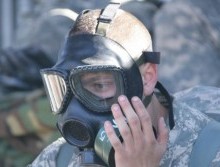If you’re concerned about your country potentially going to war in the Middle East, then you need to follow what’s happening in Syria. The opposition there is claiming more than 1,300 people were killed in a chemical weapon attack, according to CNN. If true and the regime is behind it, it would shatter all “red lines” as one of the worst attacks on civilians in recent history.
Making matters even worse for the Middle East, four rockets were launched from Lebanon at Israel on Thursday, as the region teetered even closer to regional conflict. IDF Spokesperson Captain Eytan Buchman confirmed to The Mideast Update that their initial assessment is that global Jihad terrorist elements are behind the attack. “We view this as an unprovoked attack on the Israeli homefront and we are prepared for any eventuality,” said Capt. Buchman.
He said that two of the rockets hit residential areas in Israel causing minor damage, one hit an open area, and the Iron Dome missile defense system intercepted a fourth. As of now, the situation is apparently stable in Israel. While it bears watching, past rocket attacks have not resulted in a dramatic response from Israel. But that doesn’t hold true for Syria.
In fact, France is already calling for the use of “force” if the claims of a mass chemical weapons attack are proven. “There would have to be reaction with force in Syria from the international community,” French Foreign Minister Laurent Fabius told BFM-TV, according to The New York Times. He nonetheless ruled out using ground troops in Syria, without specifying what action he did call for.
Still, it doesn’t leave much to the imagination to guess. Critics have long called for the West to impose a no-fly zone over Syria, and the chances of that are higher today. US or European fighter jets taking out targets in Syria is entirely possible. And the Israel attack makes the situation even more serious.
Why does an attack from Lebanon on Israel make the Syrian situation worse? Because the two are likely connected. Hezbollah terrorists fighting for the Syrian regime are from Lebanon. And among those fighting the regime in Syria are terrorists linked to Al-Qaeda—aka “global Jihad” elements. Whether the attack on Israel was from terrorists fighting for or against the Syrian government, it’s likely spillover from the Syrian conflict.
Best way for a Syrian regime-ally such as Hezbollah to distract from the chemical weapons attack in Syria? Get everyone worried about a new Israel-Lebanon war. So it may have been done by their minions. At the same time, enough provocation could result in just that—an Israel-Lebanon war, which might be the aim of terrorists who want Israel to fight Hezbollah and pull them away from Syria. So maybe it’s them. Regardless, everyone is more tense today than yesterday.
Surprise—it’s all interconnected, and it’s a chaotic mess now.
Why does it matter to you? Because the oil industry wants the Middle East to be stable, not chaotic and conflict-ridden. If a real war breaks out in the Middle East—either from Israel or from Europe intervening in Syria—then oil prices could surge again. Bad news for your wallet.
But at the same time, if the West does nothing in Syria, then it could lead to even worse chemical weapons attacks, which is a security nightmare for the whole world. The Obama Administration warned that chemical weapons could reach terrorists, and the reality is that the more they are out of their storage in transportation or use, the higher the risk that Al-Qaeda elements could get them. That could be very serious for Europe and even North America.
Similarly, the longer the Syria fight drags on, the more likely it is that someone will attack Israel and force them to respond.
In other words, the Middle East is reaching a boiling point, so keep watching.
(By Joshua Spurlock, www.themideastupdate.com, August 22, 2013)

